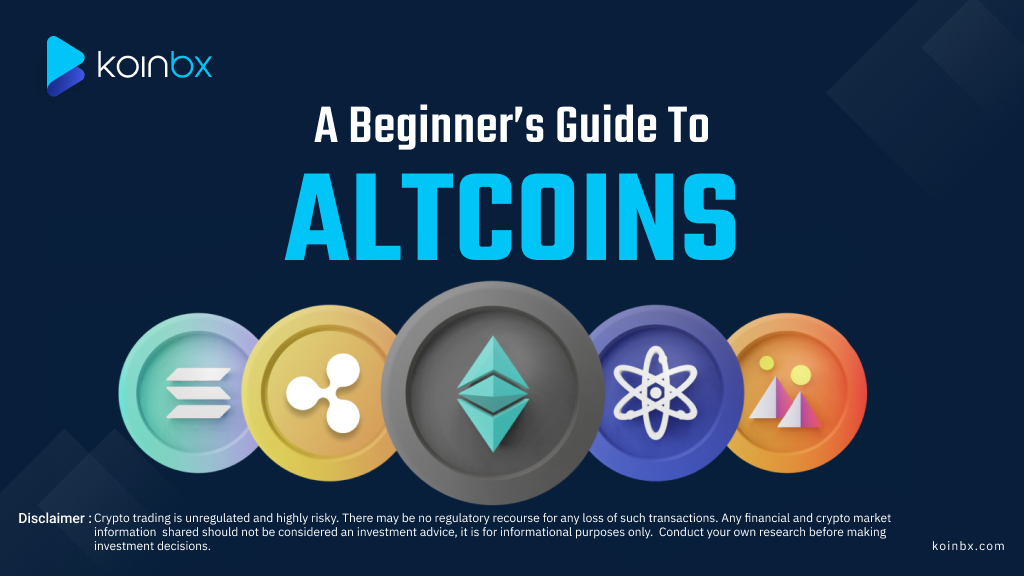Introduction
In this crypto market, Bitcoin might be the star of the show, but altcoins are the supporting cast, playing a major role in the growing digital asset ecosystem. Altcoins, a combination of “alt” (alternative) and “coin” (crypto), refer to all crypto assets except Bitcoin.
In this guide, we will explore what altcoins are, the various types, their benefits, limitations, and what the future holds for these alternative digital assets.
What are Altcoins?
The term 'altcoins' is a fusion of "alt," short for alternative, and "coins," referencing crypto assets. While Bitcoin was the first crypto asset to take the market by storm, altcoins emerged as alternatives offering different features and use cases. Since the inception of Bitcoin, thousands of altcoins have emerged, each aiming to bring new capabilities, efficiencies, or concepts to the crypto space. Understanding altcoins is essential for anyone involved in the crypto market, whether you're investing or simply learning about the technology behind digital currencies.
Types of Altcoins
Altcoins come in various forms, each designed for different purposes. Let’s break down some of the most common types you’ll encounter in your crypto journey.
1. Store of Value
These tokens are primarily used as a medium of exchange. They allow you to buy goods and services or send money across the globe. Payment tokens like Bitcoin, Ethereum, and Litecoin are designed for simple, peer-to-peer transactions, allowing you to use crypto as a digital asset.
2. Stablecoins
Stablecoins are designed to maintain a stable value by being pegged to real-world assets like the US Dollar. The idea is to keep the coin’s value relatively constant, unlike the volatility you often see with other crypto assets. Common examples of stablecoins include Tether (USDT) and USD Coin (USDC). They are often used for saving or transferring funds without worrying about significant fluctuations in value.
3. Security Tokens
Security tokens represent ownership or claims on real-world assets, such as real estate. For example, owning a security token could mean owning part of a property or a business venture. These tokens are subject to regulations and are often traded in traditional financial markets. One notable example of security token usage was crypto wallet provider Exodus's $75 million token offering in 2021.
4. Utility Tokens
Utility tokens are used within a specific ecosystem or network. Think of them like in-game currencies or loyalty points. These tokens enable access to certain features, services, or benefits within the network. A great example of a utility token is Ether (ETH), used to pay for transactions on Ethereum.
5. Meme Coin
Meme coins are often created as jokes or based on trends. They typically don’t offer real utility but can gain significant attention. One of the most famous meme coins is Dogecoin, which started as a joke, but over the years gained huge popularity. While meme coins can experience short-term gains, their value often fluctuates wildly once the trend fades.
6. Governance Tokens
Governance tokens give their holders voting power within a decentralized autonomous organization (DAO). These tokens are used to influence decisions such as protocol upgrades or project direction. One example of a governance token is Maker (MKR), which is used in the MakerDAO ecosystem to make decisions regarding the Dai stablecoin.
Benefits of Altcoins
Altcoins offer several advantages that make them an attractive option for investors and crypto enthusiasts:
Diversification: Altcoins offer a broad range of options, allowing investors to diversify their portfolios beyond Bitcoin.
Innovation: Many altcoins introduce innovative technologies, such as smart contracts and faster transactions, which contribute to blockchain development.
High Potential Returns: Some altcoins have seen explosive growth in value, presenting opportunities for high returns.
Affordability: Many altcoins are more affordable than Bitcoin, making them more accessible to new investors.
Limitations of Altcoins
While altcoins offer many benefits, there are also several limitations to consider:
Volatility: Altcoins tend to be more volatile than Bitcoin, which can lead to large price swings and potential losses.
Limited Adoption: Many altcoins are still not widely used or accepted, which can limit their real-world utility.
Risk of Scams: The altcoin market has its fair share of fraudulent projects, making it essential to carefully research before investing.
Market Saturation: The sheer number of altcoins in the market can be overwhelming, and it can be difficult to separate valuable projects from those with little potential.
The Future of Altcoins
The future of altcoins is somewhat uncertain, but the altcoin market is likely to consolidate around a few strong contenders. Just as the U.S. dollar became the dominant currency in the 19th century, the crypto market will likely see a few altcoins rise to prominence, leaving many others behind. However, as blockchain continues to evolve, altcoins with unique use cases and robust ecosystems will continue to play a critical role in the crypto space.
Investing in altcoins can provide an opportunity to diversify your crypto portfolio, but it's crucial to be aware of the risks. As the market matures, it’s likely that altcoins with solid use cases, innovative features, and strong communities will gain traction.
Download KoinBX Android App | Download KoinBX iOS App
Disclaimer: Any financial and crypto market information shared should not be considered investment advice. It is for informational purposes only. Conduct your own research before making investment decisions. Crypto trading is unregulated and highly risky. There may be no regulatory recourse for any loss of such transactions.






Comments